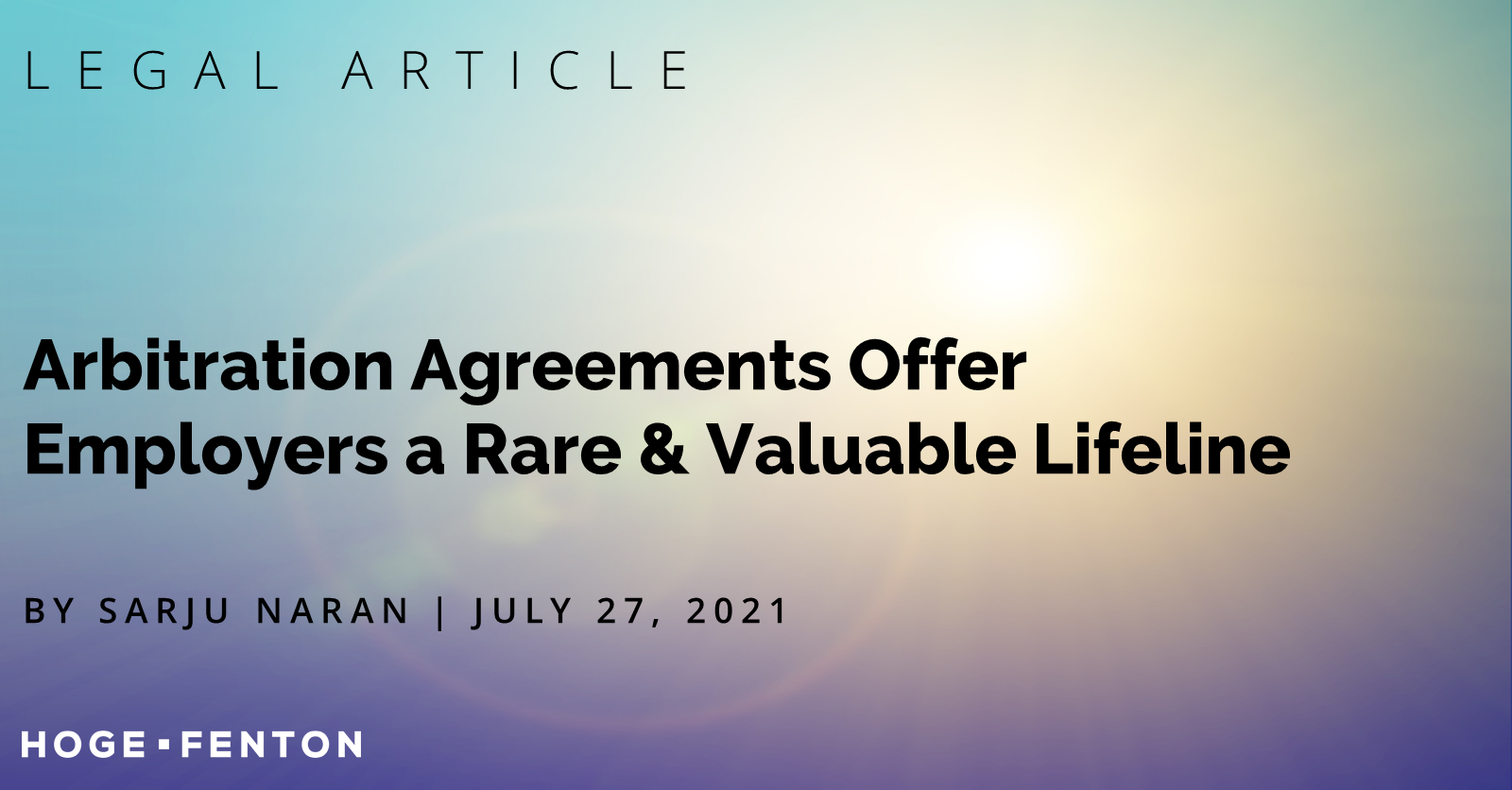Arbitration Agreements Offer Employers a Rare & Valuable Lifeline
By Hoge Fenton | 07.27.2021 | Employment Law

If you are a California employer, you already know that you operate in a state where minor, inadvertent, or unknown infractions can quickly result in exposure for high six to seven-figure settlements or judgments, especially in the context of class and Private Attorneys General Act (PAGA) actions. As discussed in our recent article, “Employers Beware! Wage & Hour Violations Can Lead to Steep Penalties,” Employers can face multiple “stacked” penalties for the same alleged violation. Employers also face the threat of having to pay the employee’s attorneys’ fees (on top of their own fees) if the employee prevails even partially on a claim.
In many instances, the employer has committed no violation at all. The allegations are unfounded, but the cost and distraction associated with litigating a case and winning can be almost as daunting as the prospect of losing, so employers will often settle disputes just to make them go away.
An arbitration agreement is a powerful tool that can help employers avoid a class action and mitigate exposure.
What is Arbitration?
Arbitration is an alternative to litigating a dispute in court. The parties select a private arbitrator (often a retired judge or experienced attorney) to serve as their “judge” for the dispute. The process typically moves much faster than it would in court. The parties get one person dedicated to their case, who is not under-resourced or overwhelmed with other cases. Parties also often appreciate that arbitration is private, which means the lawsuit and documents associated with the case won’t be filed in court and won’t be a matter of a public record. Of course, it costs money to hire an arbitrator versus using the tax-payer-funded court system, but many parties find the trade-off worthwhile.
How Do Arbitration Agreements Help Reduce Exposure in Employment Lawsuits?
Arbitration agreements can also include a waiver of class action litigation, which is particularly valuable in the employment context because it means employees can be legally prohibited from pursuing damages on behalf of dozens or hundreds of other employees and can be left with only their own individual claims to pursue.
But wait, there’s more!
The Federal Arbitration Act reflects a strong federal policy in favor of resolving disputes through arbitration. It allows employers to make arbitration agreements mandatory for their employees (with rare exceptions). Even in California, as long as certain requirements are satisfied (e.g. the Armendariz factors*), employers can require employees to sign arbitration agreements with class action waivers as a condition of employment.
*An arbitration agreement is a complex legal document. Content and wording are critical to the validity of the agreement. Please consult an experienced employment attorney to draft the agreement for you.
A mandatory agreement that requires employees to waive class actions sounds too good to be true. What’s the catch?
There are a few drawbacks/limitations to using arbitration agreements. Here are the main two:
- whereas many businesses contracts with arbitration provisions require the parties to split the cost of arbitration equally, in the context of an employment relationship, the employer has to pay for all arbitration costs (with the exception of a small initial fee), and
- arbitration agreements are not effective to prevent employees from pursuing PAGA actions, since those are lawsuits brought on behalf of the State of California for “civil penalties” only.
The net effect of the first drawback (employer-paid arbitration costs) is that employers who choose to have employees sign arbitration agreements will need to spend more money than they would on court costs to have the dispute handled by a private arbitrator. However, the overall cost of litigation may be lower than in court because the arbitration process is usually faster than the court process. More importantly, when an arbitration agreement serves to turn what would have been a class action into a single-employee arbitration, the cost savings can be huge. Typically, the cost of hiring a private arbitrator is a small fraction of what it would cost to defend a class action in court.
With respect to employees’ ability to bring PAGA actions in court even if they have signed an arbitration agreement (see our recent article, “So You Were Copied on an LWDA Letter – What Do You Do?”), arbitration agreements can still be helpful in resolving PAGA actions. For example, in a situation where an employee files both class and PAGA claims with an enforceable arbitration agreement in place, the court will typically:
- dismiss the class action (which is a big win)
- pause the PAGA claims, and
- require the parties to arbitrate the employee’s individual claims first before returning to court to litigate the PAGA claims.
In many instances, neither the employee nor the employer want a long drawn-out multi-step litigation process. As such, the parties often figure out a path for resolving all disputes between them, including the PAGA action, before the PAGA action resumes in court.
But Didn’t California Recently Prohibit the Use of Mandatory Arbitration Agreements in Employment?
In 2019, California passed a law to prohibit employers from requiring employees to sign arbitration agreements unless an employment relationship is subject to the Federal Arbitration Act (FAA). But before that law went into effect, the courts issued a temporary restraining order and then a preliminary injunction, which rendered the law ineffective until further notice. It is possible that the prohibition will become effective at some point in the future, but the courts’ injunctive rulings thus far send a strong signal that the statute will be stricken altogether. Furthermore, the California statute creates an exception for arbitration agreements that are subject to the FAA, which most are (because most employment relationships deal with interstate commerce). In short, at least for the foreseeable future, California employers can still require employees to sign arbitration agreements with class action waivers.
The arbitration issue is more nuanced for certain commercial truck drivers (where the FAA may not apply, and California courts will apply state law to conduct an analysis before determining whether to enforce a class action waiver in an arbitration agreement), but that is a discussion for another day.
The Bottom Line
For small businesses, arbitration agreements may not make economic sense because the likelihood of a court allowing employees to pursue a class action without there being enough employees involved is low. But all other employers should give serious consideration to having employees sign arbitration agreements. It could mean the difference between having a temporary financial setback and having to close your business altogether. Some employers choose to make arbitration agreements optional, which can work also and may strike a friendlier tone with your employees; as long as most employees sign, it can still be useful.
Hoge Fenton’s employment law attorneys routinely draft arbitration agreements and evaluate other risk mitigation options for our clients.
Our Employment Law Group
 |
Sarju Naran (he/him) is a zealous advocate for his clients and approaches litigation with creativity and strategy. Chair of Hoge Fenton’s Employment Law Group, Sarju’s experience spans from representing middle-market and family-owned closely held businesses to large multi-national companies. He regularly litigates and provides advice and counsel to companies on wage and hour issues, trade secret misappropriation, employee mobility, wrongful termination, performance management, and leaves of absence. |
 |
Jenn Protas (she/her) helps employers navigate California’s numerous employment laws and defends employers with an eye toward successful, yet cost-effective resolution. Jenn is a committed advocate for her clients and a tenacious litigator. She defends employers on matters related to wage and hour law, wrongful termination, harassment, discrimination, and retaliation in single-plaintiff litigation, Private Attorney General Act actions, and/or class actions. Jenn’s practice also includes housing discrimination matters and business litigation. |
 |
Maysa Saeed (she/her) is an associate attorney whose practice focuses on employment counseling and litigation and assists clients in all aspects of employment law. Prior to joining Hoge Fenton, Maysa was a litigation associate with experience litigating various commercial, employment, and real estate matters. Maysa’s prior legal experience also includes defending insurance carriers in administrative trials before the Workers’ Compensation Appeals Boards in San Jose and Salinas. |
This information is provided as an educational service by Hoge Fenton for clients and friends of the firm. This communique is an overview only, and should not be construed as legal advice or advice to take any specific action. Please be sure to consult a knowledgeable professional for assistance with your particular legal issue. © 2021 Hoge Fenton









